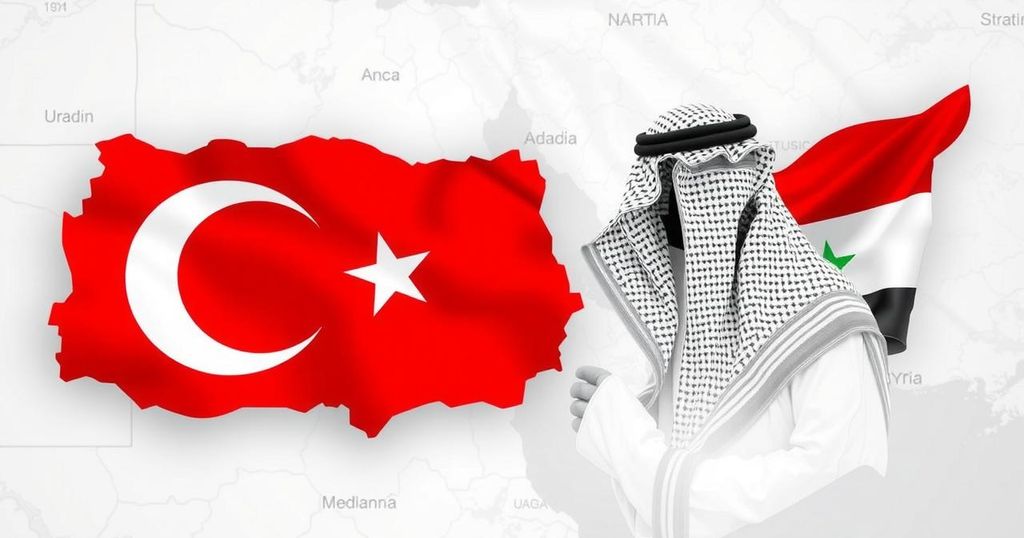Turkey Engages Gulf States for Support in Shaping Syria’s Future
Turkey is seeking support from Saudi Arabia and the UAE to influence Syria’s future after Assad’s regime collapsed. Erdoğan’s administration aims to avoid chaos similar to the Arab Spring, focusing on a non-sectarian government and regional cooperation, while addressing concerns over extremist groups and foreign dominance. Turkish officials are actively engaging with various stakeholders to support reconstruction efforts in Syria amid ongoing geopolitical complexities involving Russia.
Turkey is actively seeking support from Saudi Arabia and the United Arab Emirates (UAE) to play a pivotal role in shaping a new government in Syria following the abrupt collapse of Bashar al-Assad’s regime. Turkish officials are determined to avoid the missteps witnessed during the Arab Spring and recognize the necessity of collaboration with regional allies and Western powers to foster stability in a country burdened with a population of 20 million. President Recep Tayyip Erdoğan is engaging with Gulf nations, especially emphasizing the concerns of Saudi Arabia and the UAE regarding the rise of Islamist groups like Hay’at Tahrir al-Sham (HTS), which has gained influence in Damascus. This engagement comes as Erdoğan prepares for discussions with Egyptian President Abdel Fattah el-Sisi, who shares apprehensions about HTS’s rising power.
Erdoğan’s administration is exploiting complex geopolitical dynamics and is focused on establishing a non-sectarian, representative Syrian government. Turkish officials, cautiously optimistic about their influence over HTS, reaffirm their commitment to peace and stability, steering clear of Iranian or Turkish dominance in the region. Turkish Foreign Minister Hakan Fidan stated Turkey’s aspirations for a neutral Syria that does not directly threaten neighboring countries, notably Israel and Iran. Ankara continues to call for a cessation of Israeli airstrikes on Syrian territory.
Additionally, Turkey is actively working with various regional and international stakeholders, including a recent engagement with the Arab Contact Group and discussions about establishing a framework for Syria’s governance that prioritizes women’s and minority rights. There are expectations that reconstruction and economic support will derive from Gulf nations and Western Powers, while the influence of Russia, which has supported Assad, remains a considerable factor in the geopolitical landscape. Turkish officials are hopeful for a collaborative future, aimed at re-establishing stability in Syria with the support of both regional powers and the international community.
In recent weeks, the political landscape in Syria has been profoundly affected by the unexpected downfall of Bashar al-Assad’s regime, a development which has resulted in significant shifts within the region. Turkey, having historically been involved in Syrian affairs, sees an opportunity to redefine its influence. The Turkish government is cognizant of the complexities that beset the region, particularly the risk of extremist ideologies gaining traction. In this context, Turkey seeks partnerships with Gulf nations and Western countries to ensure that Syria stabilizes while addressing security concerns involving extremist groups and the controversial influence of Iran. Turkey’s overtures are notably significant in shaping a new governance approach for Syria that promotes inclusivity and stability against the backdrop of long-standing regional power plays, particularly involving Russia and Iran. Additionally, Turkey’s historical connections with the Muslim Brotherhood complicate its endeavors, especially given the hesitance among Gulf nations to align with such movements. The ultimate goal for Turkey is to lead collaborative efforts that reassure its neighbors and mitigate the specter of conflict and chaos reminiscent of the Arab Spring.
In conclusion, Turkey is positioned as a crucial player in the future of Syria following the sudden collapse of Assad’s government. By fostering partnerships with Saudi Arabia and the UAE, Turkish officials aim to prevent past mistakes and establish a stable government in Syria. Turkey’s objectives include ensuring the neutrality of Syria while promoting a collaborative regional order that respects sovereign rights. As the situation evolves, the response from regional and global powers will be critical in shaping Syria’s trajectory, underscoring the intricate diplomatic efforts required for long-term stability in the region.
Original Source: www.middleeasteye.net




Post Comment